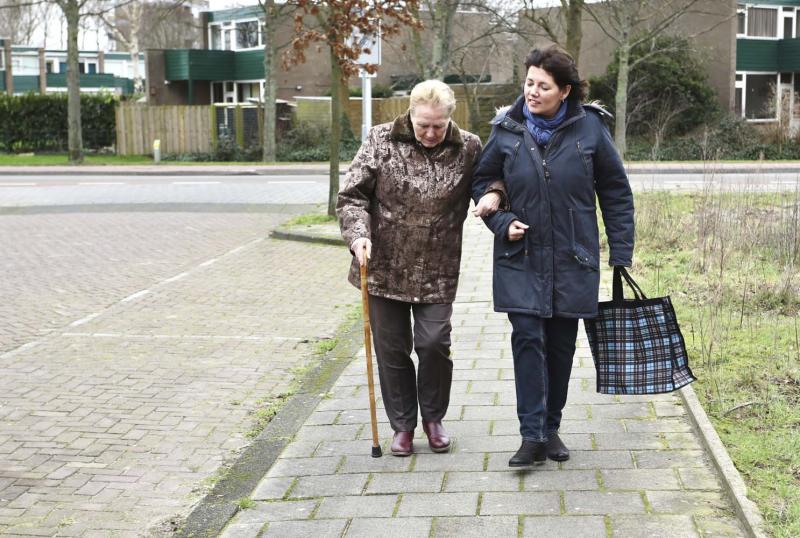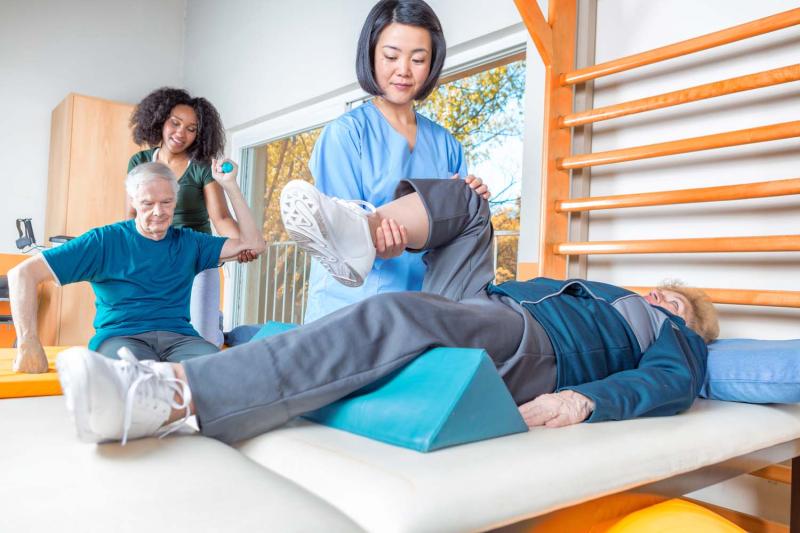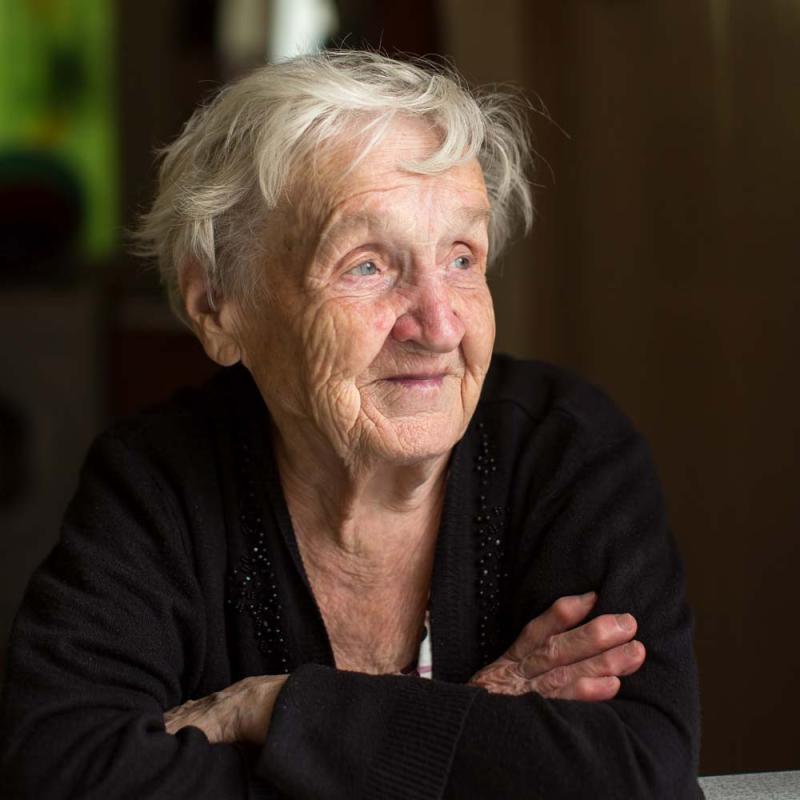Key points
- A range of allied health interventions are used to rehabilitate, re-enable, and restore older adults to previous levels of physical function.
- Allied health interventions are usually focused on enabling older adults to carry out activities of daily living (ADL) and functional tasks as independently as possible. This is of high importance in the maintenance of quality of life, physical function, balance, mobility, and cognition.
- Allied health interventions can be discipline-specific (i.e., occupational therapy) or delivered in a combined multidisciplinary approach (i.e., occupational therapy, physiotherapy, psychologists, etc).
Allied health interventions are designed ‘to maintain and optimise the physical, social, and mental wellbeing of the community.’ [1] The categories of interventions are dependent on the allied workforce providing them. Categories include therapeutic, diagnostic, technical, scientific, and complementary services. [2] Therapeutic interventions involve non-medical treatments such as those provided through physiotherapy and occupational therapy. Diagnostic and technical interventions include the use of testing equipment to assist with diagnosis (i.e., radiation therapy, sonography). Scientific interventions are laboratory-based activities (i.e., pharmacy and nuclear medicine). Complementary services are alternative practices not included in standard medical care (i.e., osteopathy).
This evidence theme is a summary of one of the key topics identified by a scoping review of rehabilitation, reablement, and restorative care research. If you need more information on this topic, try using the PubMed search below.
We found twelve reviews that reported allied health rehabilitation, restorative care, and reablement interventions. Findings reported:
- Occupational therapy (OT) can help to improve the quality of life of older people. It was not possible to identify which specific components of OT were effective, however, the nature of the intervention and professional and organisational structures were considered important. [3]
- OT services included the provision of assistive equipment, housing adaptations, and reablement services to promote independence at home and reduce hospital admissions.
- Home-based multidisciplinary rehabilitation and restorative interventions that included OT and physiotherapy interventions, improved performance in instrumental activities of daily living of older people. [4]
- Home-based OT programs focused on restorative care and activities of daily living reduced emergency department visits, and the need for home care services, and allowed older people to remain living at home longer in better health. [5,6]
- Function-focused interventions that included dressing, bathing, toileting, and grooming activities can improve physical function, balance, and mobility (including walking) for older people. [7]
- Interventions that provide rehabilitation, reablement, and restorative care are commonly provided by multidisciplinary teams of health professionals. However, reporting details of interventions and multidisciplinary team approaches lacked detail, thus limiting the reproducibility and transferability of outcomes. [8]
- Rehabilitation, reablement, and restorative home care interventions demonstrated varying impacts using a range of outcome measures, [8] including improvement in mental health wellbeing, self-reported walking impairments, mobility, physical function, and gait speed.
- Cognitive training or Cognition-Oriented Treatments are ‘techniques applied to engage thinking and cognition with the aim of improving and maintaining cognitive processes or addressing the impact of impairment in cognitive processes on associated functional ability in daily life.’ [9] Cognitive training has varying results across different outcomes among older people in aged care. Improved immediate memory [10,11] and verbal category fluency [11] were demonstrated in older adults with mild dementia. However, changes in cognition, working memory, verbal letter fluency, and executive function were inconsistent. [10-13]
Ways for a person to use allied health interventions in rehabilitation, reablement, and restorative care include:
- Assess the needs of the older person and identify appropriate strategies and allied health interventions to support their needs.
- Encourage aged care users to perform ADLs as independently as possible and repeat these tasks to maintain physical function.
- Encourage and assist older adults to engage in social and intellectual thinking activities to maintain their social connection and cognitive functions.
Organisations can support allied health interventions to improve outcomes for older people in aged care by:
- Procuring essential resources and other equipment to ensure effective implementation of allied health interventions.
- Assessing and acting to reduce barriers in local settings to ensure effective implementation of allied health interventions.
- Department of Health Victoria. Allied Health workforce [Internet]. Melbourne, Vic.: Department of Health, Victoria; 2021 [cited 2023 Jun 30]. Available from: https://www.health.vic.gov.au/health-workforce/allied-health-workforce.
- Turnbull C, Grimmer-Somers K, Kumar S, May E, Law D, Ashworth E. Allied, scientific and complementary health professionals: A new model for Australian allied health. Aust Health Rev. 2009;33(1):27-37.
- Boniface G, Mason M, Macintyre J, Synan C, Riley J. The effectiveness of local authority social services' occupational therapy for older people in Great Britain: A critical literature review. Br J Occup Ther. 2013;76(12):538-47.
- Hunter EG, Kearney PJ. Occupational therapy interventions to improve performance of instrumental activities of daily living for community-dwelling older adults: A systematic review. Am J Occup Ther. 2018;72(4):7204190050p1-p9.
- Pettersson C, Iwarsson S. Evidence-based interventions involving occupational therapists are needed in re-ablement for older community-living people: A systematic review. Br J Occup Ther. 2017;80(5):273-85.
- Whitehead PJ, Worthington EJ, Parry RH, Walker MF, Drummond A. Interventions to reduce dependency in personal activities of daily living in community dwelling adults who use homecare services: A systematic review. Clin Rehabil. 2015;29(11):1064-76.
- Lee SJ, Kim MS, Jung YJ, Chang SO. The effectiveness of function-focused care interventions in nursing homes: A systematic review. J Nurs Res. 2019;27(1):009-.
- Sims-Gould J, Tong CE, Wallis-Mayer L, Ashe MC. Reablement, reactivation, rehabilitation and restorative interventions with older adults in receipt of home care: A systematic review. J Am Med Dir Assoc. 2017;18(8):653-63.
- Bahar-Fuchs A, Martyr A, Goh AM, Sabates J, Clare L. Cognitive training for people with mild to moderate dementia. Cochrane Database Syst Rev. 2019;3:CD013069.
- Mapelli D, Di Rosa E, Nocita R, Sava D. Cognitive stimulation in patients with dementia: Randomized controlled trial. Dement Geriatr Cogn Dis Extra. 2013;3(1):263-71.
- Cavallo M, Angilletta C. Long-lasting neuropsychological effects of a computerized cognitive training in patients affected by early stage Alzheimer's disease: Are they stable over time? J Appl Gerontol. 2019;38(7):1035-44.
- Beck C, Heacock P, Mercer S, Thatcher R, Sparkman C. The impact of cognitive skills remediation training on persons with Alzheimer's disease or mixed dementia. J Geriatr Psychiatry. 1988;21(1):73-88.
- Kawashima R. Mental exercises for cognitive function: Clinical evidence. J Prev Med Public Health. 2013;46 Suppl 1(Suppl 1):S22-S7.
Connect to PubMed evidence
This PubMed topic search is limited to home care and residential aged care settings. You can choose to view all citations or citations to articles available free of charge.


